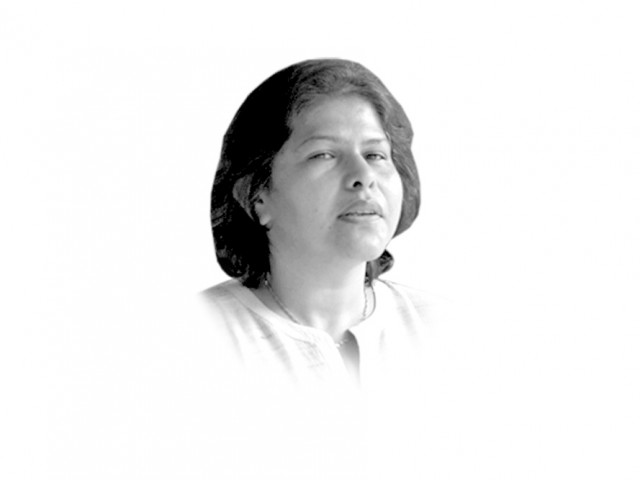

The numerous retired or serving military officers-turned-civil-military experts or the deep state’s cronies must be cursing wayward civilians for calling the bluff regarding civilians and the military being on the same page. The alacrity with which the military’s sympathisers came out with their guns blazing indicates that the GHQ is still the power that matters in this country. In fact, ISPR circulated a message on social media asking people to report anyone found posting derogatory messages about the military. The army itself, it was said, would deal with such people. The only problem with such a message is that anything could be termed insulting — the selective targeting of civilians in Balochistan and Sindh, the adventurism that led to loss of life of innocent soldiers in various military operations or many other misadventures. I once remember a conversation with a serving military officer enrolled in a master’s programme at the Quaid-e-Azam University. He insisted that the military only called those civilians ‘bloody’ who deserved to be termed as such and were against the state. He had no answer when I asked him who would decide what was against the state — would it be someone holding a gun, or a pen?
The smooth transition from one civilian government to another does not mean anything. The reason is not just because both governments demonstrated poor governance, but also because the military establishment’s network of cronies has extended tremendously. The deep state’s propaganda and ideological conversion network/machinery is as extensive and deep as itself. The media, which always served the establishment’s interests, is now its significant partner. It can trash people selectively. While Khawaja Asif is being abused as a traitor, no one talks about the fiery speeches made by Hamid Khan during the lawyers’ movement. Perhaps, those speeches will be unearthed when required.
The propaganda machine is so efficient that it takes a maximum of 48 hours before it kicks in to dissipate any negative impression created about the armed forces. The Abbottabad operation and its aftermath is a case in point. Other examples pertain to the Mehran scandal and Musharraf’s trial. In the first instance, the focus of reporting subtly shifted attention away from the two generals towards politicians. In the second case, we are being systematically reminded of how people must not think of punishing Musharraf before cleaning the country of all other evils. The people will now even be made to pay for the construction of a security wall around the dictator’s palatial house. No one in the media talks about inconvenience caused to the entire neighbourhood for a retired general’s silly decision to return home to claim an imagined political victory which he saw in the form of thousands of Facebook supporters.
But the more important question is how does one convince the military to step down off its high horse? Notwithstanding the argument that nothing can change unless civilians bring about what may appear as the ideal rule of the first four caliphs of Islam, the fact is that militaries only back down once the cost of intervention far exceeds the benefits. Political militaries depend upon legitimacy as much as any political stakeholder. Surely, better governance increases a political government’s comparative legitimacy but should the absence of it mean that power cannot be negotiated? The propaganda machine of the deep state is so powerful that it makes us believe that a weak political setup is no alternative to a seemingly strong military.
The political establishment in a ‘democracy in transition’, where the overall environment is predatory, is open to manipulation. The government can be threatened and gagged at will. Most leaders believe that top generals, who may otherwise be partners in lucrative deals, will not threaten them. Or it is believed that they are in a safe position to increase the cost of intervention for the military such as by gaining approval of foreign states or ability to acquire money from foreign sources. Politicians are often misguided by their contacts with the armed forces leadership (Nawaz Sharif has a previous experience of this).
What political stakeholders do not realise is that the cost is always measured in terms of the opponent’s capacity to punish physically. In Latin America, for instance, the power of regional stakeholders, compounded by the willingness of people to fight back physically, convinced their militaries to back down (even there, the democratisation project is not complete and some militaries are regaining power after the threat dissipated). Another example pertains to threat posed by militants. Barring the Swat and Waziristan operations, the military is reluctant to launch a major operation. It has, of course, used the political government to risk its reputation and neck in its offering to negotiate. Just for a minute replace Khawaja Asif with Maulana Abdul Aziz, Fazlur Rehman Khalil or other clerics hanging around Islamabad or other parts of the country. How many times does ISPR issue to them the kind of threats that were posted on Facebook or communicated to the government?
The political forces are too divided and weak to be considered a threat. We are all too tied down in allurement of temporary gains to join hands and make the military realise that the only recipe for saving the country is to respect its civilians.
Published in The Express Tribune, April 17th, 2014.
Like Opinion & Editorial on Facebook, follow @ETOpEd on Twitter to receive all updates on all our daily pieces.















COMMENTS
Comments are moderated and generally will be posted if they are on-topic and not abusive.
For more information, please see our Comments FAQ